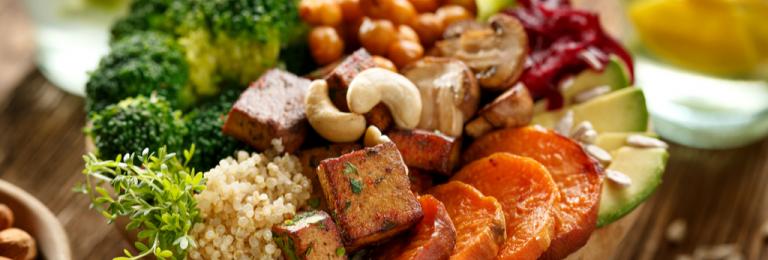Plant-based Proteins for Children
The new Canada’s Food Guide recommends we choose protein foods that come from plants more often. Eating plant-based foods regularly can mean eating more fibre and less saturated fat which can have a positive impact on health. As well serving more meals made with plant-based proteins like beans and lentils can be less expensive than those that feature meat and poultry. Introduce children to a wide variety of plant-based protein foods early on (starting at 6 months) and serve them regularly to help them develop a love for them.
What to choose:
- Legumes and pulses (e.g. beans, peas and lentils) are the most sustainable and affordable protein sources on our planet. Legumes add nitrogen to the soil when they grow, making the earth healthier Try making hummus or refried beans or simply snack on edamame (young soybeans). Green peas are also a good source of protein and are come into season in the spring! Add them to pasta dishes, soups or simply pop them in your mouth one by one. Saskatchewan is the world’s largest producer of lentils—try them braised, curried or in soup or salad. Dried legumes are more affordable (keep them away from young children in dried form as they could be choking hazards) but canned are more convenient and just as nutritious. Drain and rinse to help remove added salt and gas-producing starches.
- Nuts and seeds are good sources of protein, fibre, healthy fats, and assorted levels of certain vitamins and minerals. Do not give whole nuts and seeds to children under 4 years old as they can be choking hazards. Chop them finely and add them to cereal, porridge, yogurt, baking or as breading. Nut and seed butters are also great but should be spread thinly on crackers, bread or banana as a large chunk of nut or seed butter can form a “plug” that can block the airway. If you are a caregiver, check with the parents before serving nuts to a child.
- Note: New recommendations regarding the prevention of food allergies suggest that introducing commonly allergenic foods, like peanuts, earlier (around 6 months) seems especially helpful for reducing the risk of developing allergies to these foods. Suggestions on how to prepare peanut and tree nuts for babies can be found here.
- Whole grains like quinoa, oats, buckwheat, barley, wheat, spelt, rye and millet also contain some protein (about 5-6 grams per cup cooked) which can help supplement protein from other sources.
For more information:
https://www.healthlinkbc.ca/healthlinkbc-files/prevent-choking-baby-child
https://www.healthlinkbc.ca/healthy-eating/reducing-baby-food-allergy-risk
